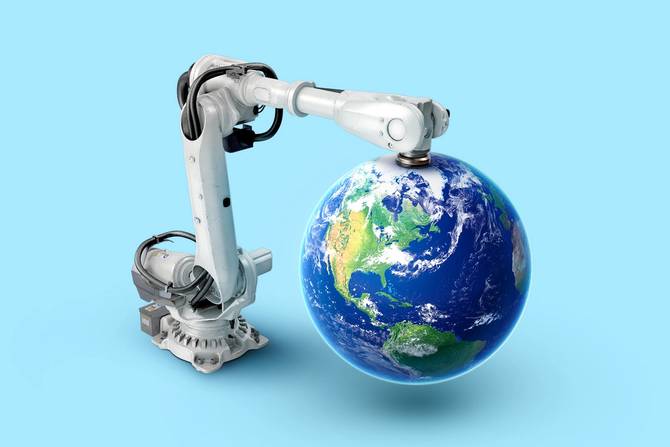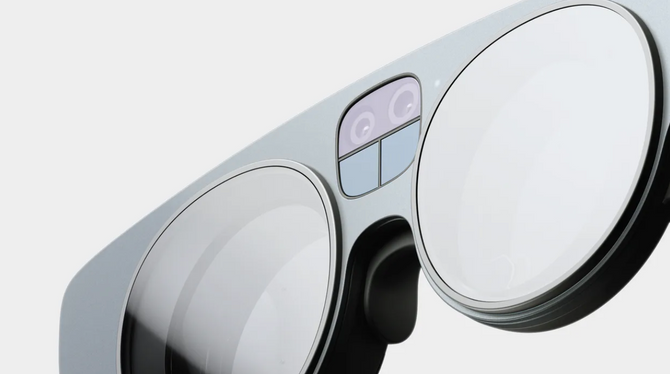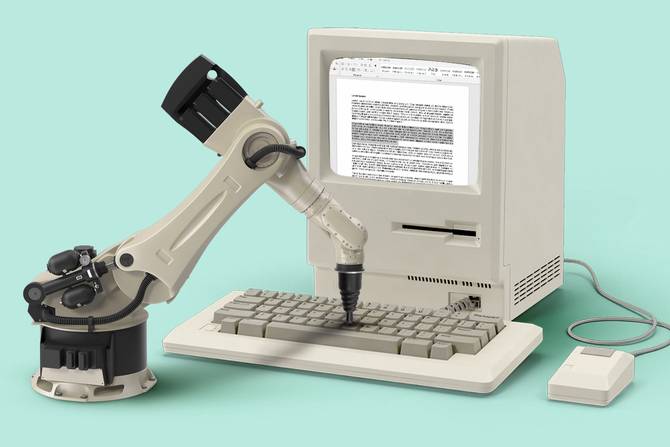Hi there. Buckle your autonomous-vehicle seat belts: You’re about to read the first-ever edition of Emerging Tech Brew that was 100% written by women. As our dearly beloved Shania Twain would say...let’s go, girls.
In today’s edition:
 The AI workforce The AI workforce
 GM’s automated driving GM’s automated driving
 Magic Leap’s comeback plan Magic Leap’s comeback plan
—Hayden Field, Grace Donnelly
|
|
|
Frank Scialabba
Soon, parents all over the world will be asking their adult kids: Why didn’t you go into a career in AI?
In 2019, the AI workforce made up 9% of total US employment. And over the next decade, employment in AI-related occupations is projected to grow twice as fast as employment in all occupations, according to data from the Bureau of Labor Statistics.
But there’s a problem with this rate of growth: Education and workforce policy haven’t caught up, according to a new paper from the Center for Security and Emerging Technology (CSET), a Georgetown University–based think tank.
State of the union
Before making recommendations, CSET researchers set aside four months to analyze current AI-education offerings in the US—looking into related curricula, after-school programs, summer camps, federal initiatives, and more. They also interviewed leading AI companies to get an idea of future demand and hiring, though CSET declined to specify which companies.
The researchers found that right now, a dedicated AI education and workforce policy simply “does not exist.” In fact, they wrote, what we have “is piecemeal and based on inconsistent definitions of the AI workforce.”
But new legislation is in the works. The researchers' findings are aligned with proposals in the bipartisan US Innovation and Competition Act, which could authorize more funding for the NSF and education and training in AI, if the House and Senate versions of the bill can be successfully negotiated.
Plan of action
One of the researchers' main goals for the paper? To underline the differences among science, technology, engineering, and math education versus programs specific to AI.
“I kept saying this over and over and over and over to my boss: I do not want another report that says we need to invest more in STEM education,” Diana Gehlhaus, a CSET research fellow and coauthor of the paper, told us. “What does investing in STEM education actually consist of...and what mechanisms do you need to actually reach youth of all different backgrounds and interests? Because again, this is a really nuanced conversation. So just saying, ‘Investing more in STEM’...If I’m a staffer on the Hill, it doesn’t necessarily help me. It’s very broad.”
Big picture: The researchers’ top three takeaways for policymakers? The US needs to increase its supply of AI PhDs since research suggests there’s a supply-demand gap for top-tier talent; “sustain and diversify” pipelines for technical AI roles; and introduce AI education into K-12 curriculums.
Click here to read the full story.—HF
|
|
|
GM
General Motors is beefing up its automated driving features. Last week, the automaker unveiled Ultra Cruise, its brand-new advanced driver-assist systems (ADAS) technology.
What’s new: GM says Ultra Cruise will be able to drive on more than 2 million miles of paved roads in the US and Canada and handle 95% of driving situations when it launches. The system will also be equipped to change lanes (both automatically and on-demand), make left- and right-hand turns, avoid close objects, and park in residential driveways.
It could eventually cover more than 3.4 million miles of both urban and rural roads and would be able to navigate stop signs, traffic signals, and other things that are currently beyond the capabilities of Super Cruise.
- For comparison, Super Cruise covers more than 200,000 miles of divided highways across North America.
- Darryll Harrison Jr., GM's director of global EV/AV communications, told Emerging Tech Brew that Ultra Cruise was a “significant next step” in its goal to eventually enable “door-to-door hands-free driving on every public paved road in the US and Canada.”
The company said the system will be available in some luxury models in 2023, while more mainstream models will be equipped with Super Cruise.
Ultra Cruise uses sensors like cameras and radar to navigate accelerating, braking, and steering, but one big change is that this next-generation ADAS includes lidar.
- Since these laser sensors are so expensive, it’s currently uncommon to find them in consumer cars—though Lucid Motors and Volvo have plans to release production vehicles equipped with lidar before 2023.
But but but: While Ultra Cruise will be able to handle more complex maneuvers, it is still a Level 2 system like Super Cruise. And research suggests that ADAS systems tend to lead to less engaged drivers.
Click here to read the full version of this story.—GD
|
|
|
|
You like your eggs a certain way. Maybe you’re an over-easy person, maybe you’re all about a runny poach.
The same is true of crypto—everyone has their own unique reason for getting involved. And now, there’s a platform that gets that: Bitstamp.
Most other crypto platforms kinda act like everyone likes sunny side up—and we all know that’s not the case. Bitstamp humanizes the sometimes anonymous crypto world and embraces the wide range of humans in the space.
That’s why they let you invest securely, and in your own way. Purchasing is fast, simple, and safe. You’ll be supported, whether you like to stay diversified or prefer to double down on your favorite coin.
Not only that, Bitstamp’s interface is super intuitive, and if you have any questions, they provide 24/7 support.
Join the crypto platform that understands your individuality here.
|
|
|
Magic Leap
Like many of us, Magic Leap had a tough 2020. Now, the AR startup is talking big about its plan to turn things around.
On Monday, the company announced a $500 million funding round, which puts Magic Leap at a “post-money valuation of roughly $2 billion,” according to its own release. It also introduced its brand-new AR headset, Magic Leap 2, which is slated to ship in 2022—though select customers are already beta-testing.
Context, please
In 2010, Magic Leap began its operations in stealth mode. Eight years after its founding—and after raising ~$2.6 billion from investors including Google, Alibaba, and a16z—the company debuted its first product in August 2018: a consumer AR headset.
Since then: Magic Leap has had its ups and downs, starting with the fact that it fell seriously short on its 100,000-headset sales goal in 2018—moving just ~6,000 units in the first six months, The Information reported. That likely contributed to its $40+ million/month burn rate that year.
- In 2020, Magic Leap laid off about half its employees, lost its CEO and cofounder, and looked to sell itself at a $10 billion price tag.
Then it decided to move away from consumer headsets and focus on enterprise clientele. The company’s new headset, Magic Leap 2, is aimed at corporate customers and use cases like training or collaboration between teams. The company did not respond to a request for comment.
Big picture: It’s a tough time to be a mixed-reality startup—especially if your clients are consumers. The consumer AR boom could be years away, and tech giants are in it for the long game with money to burn. That’s why we’re seeing companies like Magic Leap pivot to courting enterprise customers.
Click here to view this story on-site.—HF
|
|
|
|
Lawyers shouldn’t create products for doctors. So why do accountants have to use stuff created by techies? FloQast was founded on the idea that accounting software should be built by the people who use it: Accountants. Their cloud-based accounting tech was made by people who understand old-school problems so they can build modern solutions. Learn more here.
|
|
|
Francis Scialabba
Stat: A third of tech providers plan to invest $1+ million in AI over the next two years, according to a survey from Gartner.
Quote: “I have a shortage of chips and a shortage of time. We’re in a hurry.”—Cristiano Amon, CEO of Qualcomm, on the global chip crisis
Read: How a change to Zomato’s algorithm blindsided some delivery riders—and led to stolen bikes and missed wages.
A remarkable return: You can earn 20% per year on your funds invested in Transparent Business’s High-Yield Notes. These folks are working to democratize access to pre-IPO investment opportunities while providing financing to emerging growth companies. Get in on the action here.*
*This is sponsored advertising content
|
|
-
Facebook experienced another outage Friday, this time due to configuration changes to routers inside the company’s data centers.
-
Foxconn’s first electric vehicle, Foxtron, was spotted during the shipping process, ahead of its official unveiling.
-
A robotics engineer modified an iPhone to use a USB-C connection.
-
LG will pay $1.9 billion toward the $2 billion in costs from GM’s recall of Chevrolet Bolt batteries.
|
|
How much do you know about the tech powering tech? Since data centers run the internet, we dedicated this week’s trivia to them.
Take the quiz here.
|
|
|
For the final frontier: This morning, William Shatner—best known for playing Captain Kirk in the Star Trek franchise—became the oldest person to reach the boundary of space via an automated Blue Origin flight. Watch the livestreamed liftoff here.
For cleaning house: If you’re like us and misplace your phone every five minutes, we’ve got news: MIT developed a robot that can locate lost stuff in a pile of clutter, using machine learning, radio frequency, camera input and—most importantly—a robotic arm. Watch it in action here.
|
|
Catch up on the top Emerging Tech Brew stories from the past few editions:
|
|
|
Enjoying the newsletter? Share it with your network to take advantage of our rewards program.
When you reach 3 referrals, you'll be invited to Monthly Exclusive Events with our co-founder Alex and the biggest names in business.

Hit the button below to learn more and access your rewards hub.
Click to ShareOr copy & paste your referral link to others:
morningbrew.com/emerging-tech/r/?kid=303a04a9
|
|
|
Written by
Hayden Field and Grace Donnelly
Was this email forwarded to you? Sign up
here.
|
ADVERTISE
//
CAREERS
//
SHOP
//
FAQ
Update your email preferences or unsubscribe
here.
View our privacy policy
here.
Copyright ©
2021
Morning Brew. All rights reserved.
22 W 19th St, 8th Floor, New York, NY 10011
|
|










